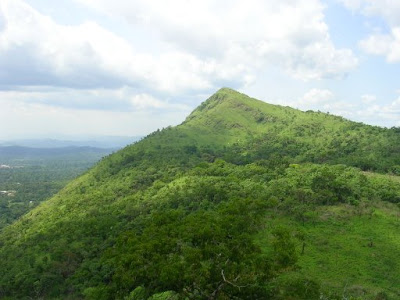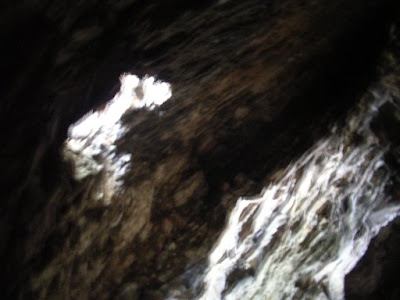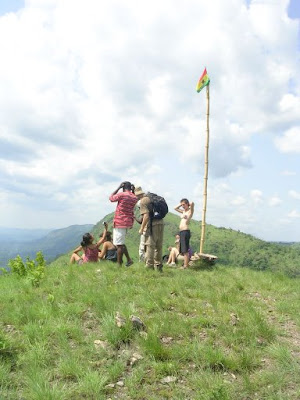The next week was very uneventful, except for some general musings, but those will come soon. I ended up the next weekend on a trip with a relatively big group (10 of us, 1 Ghanaian named Capito, the third Salia brother from Larabanga) and 9 Californians. I left in the mid afternoon between two groups, and traveling by myself was refreshing. Everyone I asked for directions was very helpful, and I ended up eating lunch with and talking to the two men in my row of seats. I also saw the sunset from the car over the Volta Region, which is the most beautiful area in Ghana. I arrived in the dark, walked to the hotel by a woman who is from Wli who said her name was either Gloria or Vivian. I arrived at dusk to see the crowd at the table. We had a few drinks, hung around and heard a lot of music coming from town. Somebody asked what it was for, and one of the hotel workers said the middle school students had just finished their exams, so the whole town was having a large block party. We gathered into the hut they had rented, waiting nervously for the other half of our group to arrive. We made tea, had some biscuits, and people slowly started falling asleep.

I made my way to the other room and settled down right under the fan. The others came in the middle of the night, and settled quickly. You can imagine my amazement, after arriving in the dark, to find this beautiful view right outside of our guesthouse bedroom. The large bedroom was inside the main house with the kitchen and bathroom. The early-arrivers had taken a hut on the grounds. In the middle of a large tropical garden was the large gazebo, perfect for gatherings in the shade.

Bordering the gazebo was this little fella, much better behaved than the parrots at home. He occasionally eeked out a "hello" even though his owners are German, but was mostly very quiet. He looked like he was being kept as well as a domestic bird in a tropical jungle could be.

We took our time with some tea, coffee and bread for breakfast

And identified some cool insects including this preying mantis before we caught a tro-tro to the next town and stopped at the tourist office. This area is a national park, so they require you take a guide with you. We were happy to do it because the goal for the day was exploring some historical caves in the area used by early settlers in the region as well as hideouts during slave-hunting raids.

It felt so good to be hiking again, moving around, and we had plenty of water with us, fortunately. The pace was nice and leisurely, and offered a lot of time to appreciate the gorgeous view of the valley


From there we hiked through a series of caves. The first was a conference room for important members of the tribes that settled in the area. The second was a hide-out with a sky-light, the third was a look out, the fourth was deep and full of bats (which, we discovered, some people are terrified of. They were actually really cool looking, but it was eerie to be in a dark cave and feel the flapping of leathery wings on your cheek, catching the occasional glimpse of a pair of glowing eyes).

The fifth one was the chief's residence and allowed cool air to sweep through towards the entrance (remember, it's really hot in this country), and the sixth had openings on both ends. I don't remember if it had a particular use, but I think we just walked through it.


Yay! Caves! They were connected by a slippery trail, mostly supported by ropes, and we did a little clever hopping and climbing to get through the last long upward cave tunnel until we reached a path toward the top of the hill.

We paused at the area just below the top with a big tree swing and then continued to the top to break for lunch- mostly just snacks we bought on the side of the road including crackers, cheese, cookies, and peanuts. We hung out there for a while, looking occasionally toward the Togo border, and down into the Volta River valley.

As we made our way down the mountain, we heard drumming from a few different towns. It had echoed up during the hike, and endured the whole day. Celebrations everywhere. When we made it down, our guide took us to a small waterfall that he knew about. To get there we had to walk through a grove of mango trees bearing dozens of ripe orange mangoes about the size of your fist that you can peel and shove into your mouth. Katie and Thien Vinh each ate 8. We then walked through a grove of orange trees, avocado trees, and the cocoa trees. It was basically heaven.

We'd gorged on so many mangoes that we were relieved to find the small

waterfall and wash off underneath it.
We played for a long time before our guide took us back to the village. We waited patiently on the roadside, and an old man walked by at one point greeting us. He invited me to play football with the village, but I could barely move. I hadn't hiked or exercised in months, so I was happy to rest on the roadside. We eventually negotiated an expensive tro-tro back to the resthouse and were greeted by fog over the glorious vista. The sun was setting and that sparked a debate about where to eat dinner. Some of us stayed even though the food was expensive because it started to rain and we were starving. The other half of the group headed into the rain storm. Shortly after they left the lightning began. It started relatively far away, but the crashes were big, and I saw one bolt hit the ground about 150ft away lighting up the surrounding area. You could clearly make out several objects each time it struck- this flower bush, that car, etc. It was a rough storm, but we happily played Uno under the gazebo eating and drinking. The other group eventually returned and had apparently eaten antelope (endangered in the region) and stew. We all played around for a while before moving towards the showers and beds once the rain let up.
Kelli and I had agreed to wake up to see the sunrise the next morning. It was small, but there was a bright patch of sky among the green hills that glowed from gray to a creamy gold. It was beautiful, and there was fog around the hills. We enjoyed it silently, and then went back to sleep curled under sheets under the ceiling fan. When we both woke up an hour later, it was dumping rain outside. Elaine and Natalie woke up too, and we made rolls with PB and J for breakfast and ordered coffee from the kitchen next door. I sat in bed for a long time reading the New Yorker (that I had inherited from my friend Raia), sipping coffee, eating a roll with PB and J (I haven't had jelly in weeks either) watching the rain fall through the open door in front of the bed. It was a perfect morning. We ran out to the gazebo after a while to join the rest of the group and the rain died down. Everybody had different ideas about the day, so we split up.

Natalie and I hiked toward Wli Falls, one of the biggest tourist attractions in Ghana. The hike was beautiful, punctuated by occasional butterflies, and we arrived at the largest waterfall in West Africa


It felt like standing in front of a giant fan. It was actually cold. I couldn't believe the sensation. The spray of the water made it feel like the sea-side. The walls adjacent to the fall were covered in foliage and napping bats. We were the only ones there, except for some benches and piles of garbage that others had left, it felt like we were out of this world. It was an amazing site to see...

and to swim in! I couldn't help it. I love waterfalls, a love more inexplicable than that for elephants. They are so simple, but very ecologically and geologically complicated. Their simplicity also evokes a natural beauty that you don't often see when dealing with super complex ecosystems. It's just water falling, but it's very powerful (I was breathing hard under there!). It felt very cleansing and nice.
I donned my raincoat and we walked back toward the entrance meeting Katie, Capito and Elaine on the way up. We met the rest of the group at the bottom, and although we had planned to stop for lunch because we were starving, we decided it was best to stay with them. We all hopped in a tro-tro and Natalie and I despaired about walking all day eating nothing but white bread (mine is a love for vegetables, hers for meat, so we were both unsatisfied), but we survived. The tro-tro came in a while after sunset and we made it home, exhausted from another long day. I again unpacked, showered quickly and fell asleep knowing my early class would probably meet the next day.








































